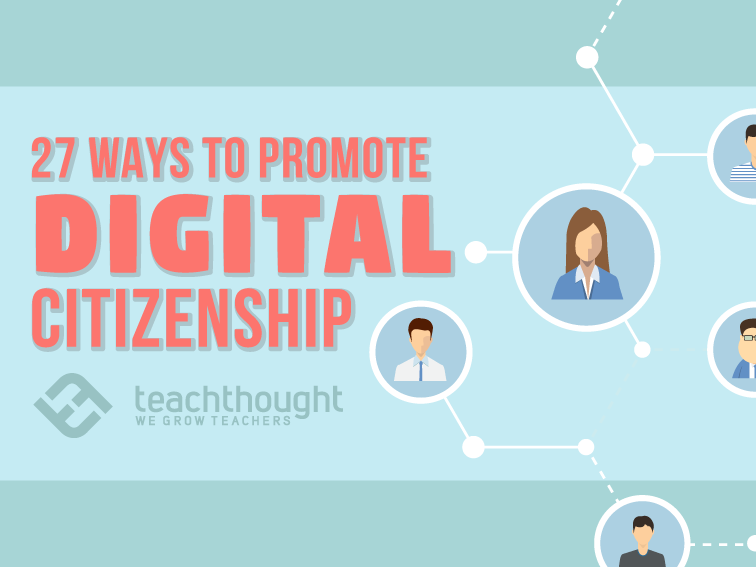
The Basics Of Digital Citizenship: 27 Power Verbs to Guide Children Online
by TeachThought Staff
How can you promote digital citizenship in students?
We’ve offered that the definition of digital citizenship can be thought of as, roughly, “The quality of habits, actions, and consumption patterns that impact the ecology of digital content and communities.” In short, citizenship online and offline is very similar. It boils down to treating people and places with the respect and care required to help them thrive.
But of course, there are some differences between digital and physical spaces, and in the infographic below, Mia MacMeekin provides 27 tips to help children (and adults) practice quality digital citizenship habits.
The Basics Of Digital Citizenship: 27 Power Verbs to Guide Children Online
1.Use
Use technology to gather information, communicate, or just have fun.
2. Engage
Engage in the world through social media. Crowdsource! Inquire! For further reading, you can find ways to use twitter for critical thinking.
3. Respect
Respect others’ point of view online. Accept what they say as meaningful and then explain why you disagree.
4. Give
Give the author/creator credit for any work you use, remix, or repurpose.
5. Voice
Respectfully voice your opinion through a technological venue.
6. Sift
Sift through the resources you have gathered online.
7. Seek
Find different voices and points of view on a topic.
8. Include
Include all who wish to join and invite others whose participation could be valuable.
9. Listen
Listen to what others are saying. Engage in active listening techniques.
10. Research
Research a topic using a variety of credible media sources and formats.
See also How To Cite A Tweet
11. Credibility
Determine if the source is credible–and by whose standard.
12. Master
Master the use of prevailing locally available technology, from hardware to software, mobile and wearable technology to online and offline devices and data sources.
13. Create
Create a blog, social media profile, website, YouTube channel, public or private group, Reddit profile, etc–then contribute to that ‘creation’/platform in a meaningful way.
14. Participate
Participate in other cultures through digital platforms–and do so with empathy and understanding.
15. Stand
Stand up against bullying and injustice when it’s clear and you feel safe and empowered to do so.
16. Disseminate
Disseminate useful and credible information.
17. Network
Network with experts in the field. Skype with experts, for example. Bring experts to the classroom through a digital medium.
18. Identify
Be diligent–identify scams, misinformation, spam sources, toxic people/communities, and other places and people to avoid.
19. Cross-Reference
Cross-reference all sources. Verify form more than one additional source is possible.
20. Use
Use caution when talking to people you don’t know.
21. Maintain
Maintain your privacy. Do not share personal or private information unless the context calls for it–and then do what you can to check the security of the storage of any information you divulge.
22. Set
Use privacy settings like double log-in verification, then recheck them at least twice a year.
23. Limit
Limit your screen time, social media exposure, and monitor your thinking and perception to limit how ‘digitally-sourced’ your sense of self and reality becomes.
24. Talk
Talk to someone–a trustworthy adult, ideally–if you meet someone online or you read something that disturbs you.
25. Utilize
Utilize proper online manners, norms, common sense, and general ‘human’ etiquette.
26. Access
Only access the technology when you are supposed to. Ground rules may need to be set.
27. Explore
Explore what other students are doing around the world. Have fun and embrace the possibilities technology allows.
27 Power Verbs to Promote Digital Citizenship
